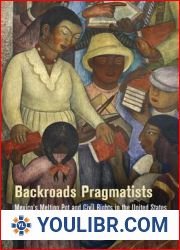
BOOKS - Backroads Pragmatists: Mexico's Melting Pot and Civil Rights in the United St...


US $7.57

335603

335603
Backroads Pragmatists: Mexico's Melting Pot and Civil Rights in the United States (Politics and Culture in Modern America)
Author: Ruben Flores
Year: May 23, 2014
Format: PDF
File size: PDF 6.9 MB
Language: English
Year: May 23, 2014
Format: PDF
File size: PDF 6.9 MB
Language: English
Like the United States, Mexico is a country of profound cultural differences. In the aftermath of the Mexican Revolution (1910-20), these differences became the subject of intense government attention as the Republic of Mexico developed ambitious social and educational policies designed to integrate its multitude of ethnic cultures into a national community of democratic citizens. To the north, Americans were beginning to confront their own legacy of racial injustice, embarking on the path that, three decades later, led to the destruction of Jim Crow. Backroads Pragmatists is the first book to show the transnational cross-fertilization between these two movements.In molding Mexico's ambitious social experiment, postrevolutionary reformers adopted pragmatism from John Dewey and cultural relativism from Franz Boas, which, in turn, profoundly shaped some of the critical intellectual figures in the Mexican American civil rights movement. The Americans Ruben Flores follows studied Mexico's integration theories and applied them to America's own problem, holding Mexico up as a model of cultural fusion. These American reformers made the American West their laboratory in endeavors that included educator George I. Sanchez's attempts to transform New Mexico's government agencies, the rural education campaigns that psychologist Loyd Tireman adapted from the Mexican ministry of education, and anthropologist Ralph L. Beals's use of applied Mexican anthropology in the U.S. federal courts to transform segregation policy in southern California.Through deep archival research and ambitious synthesis, Backroads Pragmatists illuminates how nation-building in postrevolutionary Mexico unmistakably influenced the civil rights movement and democratic politics in the United States.Published in cooperation with the William P. Clements Center for Southwest Studies at Southern Methodist University.














































